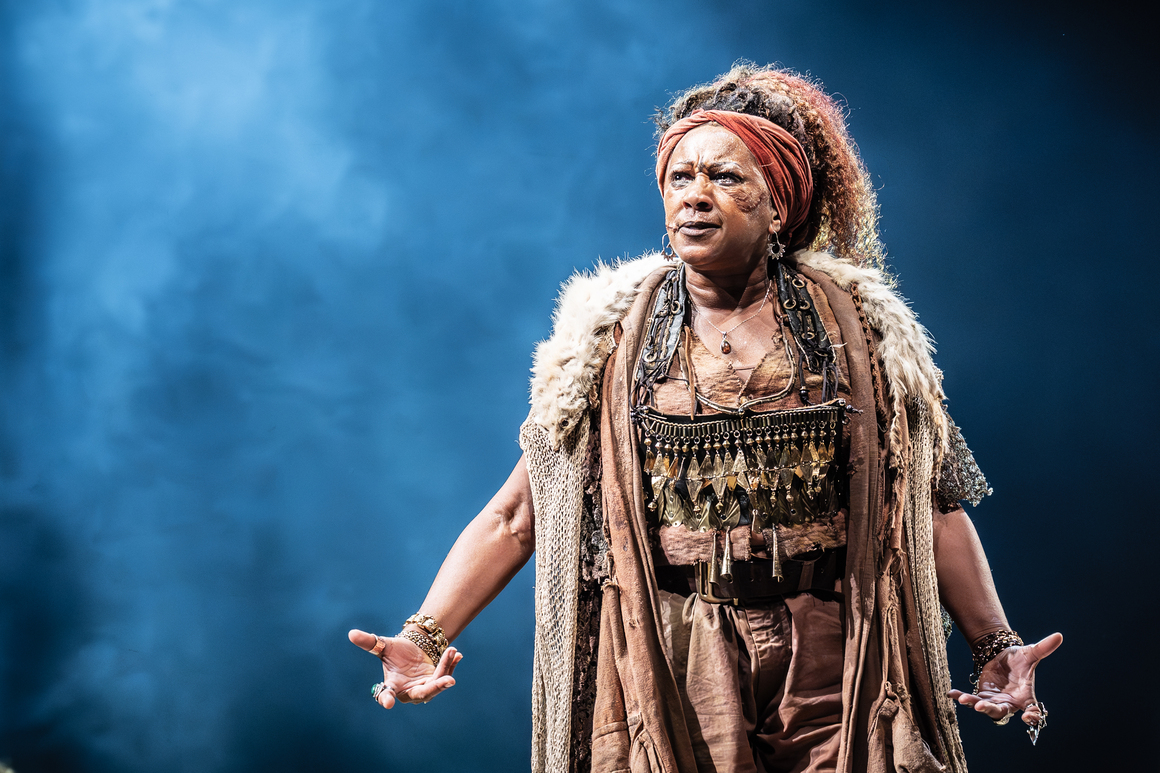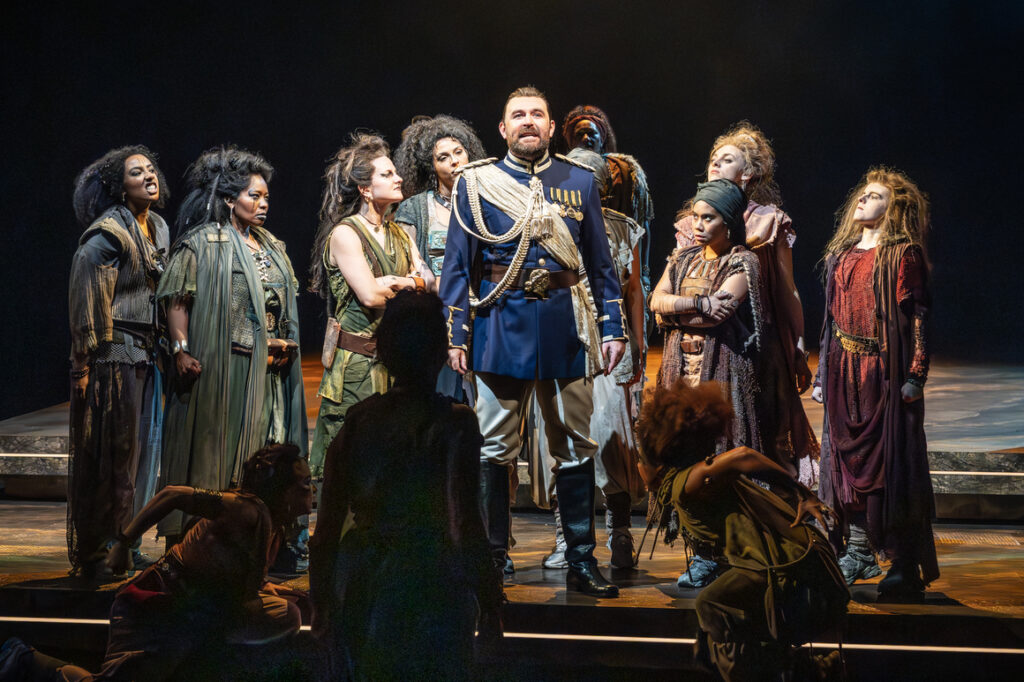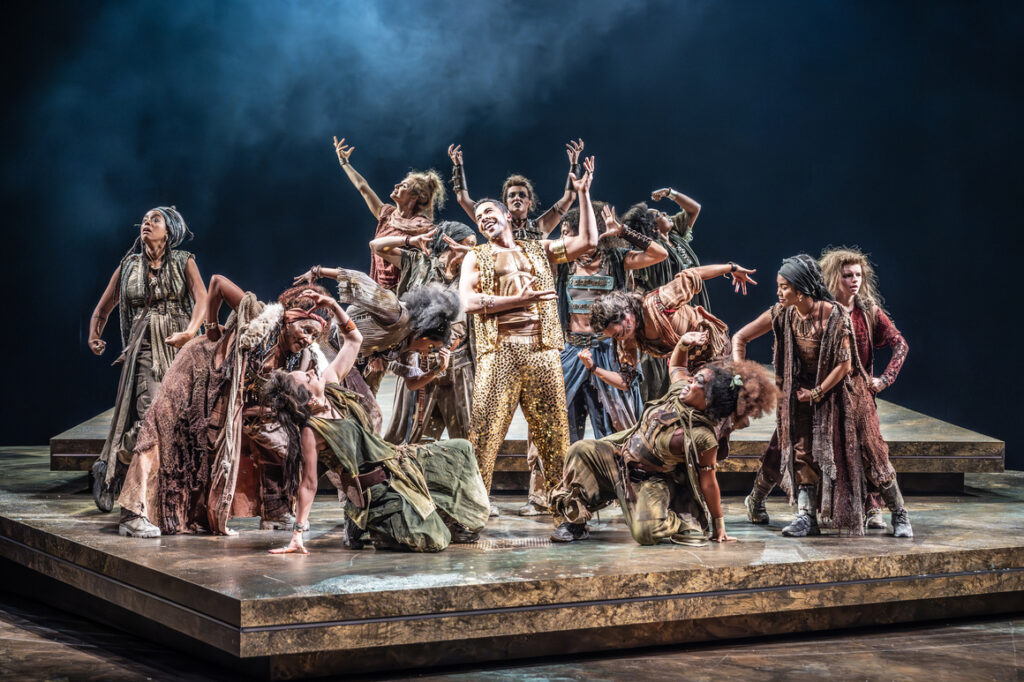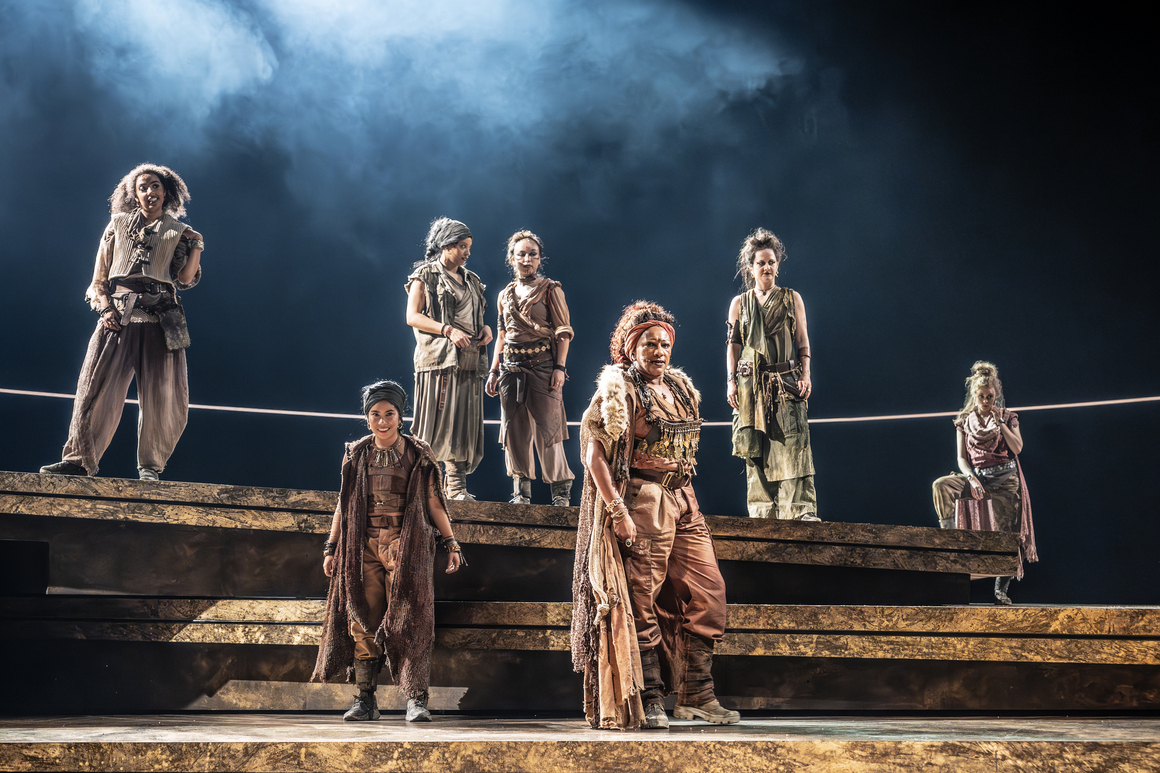Review by Simon Jenner, September 24 2025
★★★★
“So melodramatic! Bigman relax with the theatrics!” Anyone who’s just been proscribed as part of a terrorist organisation for holding up placards can breathe again. They’ve got the God Dionysos and more importantly, Bacchae onside. And Euripides and Nima Taleghani. Who making his debut for the stage adapts Euripides’ Bacchae for the National Theatre’s Olivier directed by Indhu Rubasingham till November 1. Proscribers everywhere, beware.
No placards though. Taleghani amplifies Bacchae, doesn’t distort it to any thorough-going update; though contemporary references ripple through with playful winks. Proscribing, even executing women for laughing might resonate as the Taliban for us, yet Pentheus (James McArdle) does just that; it’s pointed up. Youthful tyrant king of Thebes and cousin to Bacchus (it’s complicated but think of Semele and Zeus’ thigh), he’s also a miswired mummy’s boy; with toxic masculinity well-developed. And his mother Agave (Sharon Small) has just been abducted by the Bacchae. They both want to take up residence and have attracted all Thebes’ women to join them. Pentheus isn’t happy.

Clare Perkins. Photo Credit: Marc Brenner
Running at 110 minutes, this adaptation doesn’t have the original’s inexorable ratcheting-up of tensions leading to a horrific apotheosis; which is tricky to bring off at the best of times. Those elements are there, but Taleghani is more intent on exploring individuals within the Bacchic group, tensions between them; and uniquely, a split.
There’s much stripped away, as in most adaptations. Which tend to exclude grandfather Cadmus, here morphed into the younger Bubull. Tiresius’ role is pared back, but survives. The comedic diffuses the brutal, both characters and language. Lucy Kirkwood’s admonition about male playwrights appropriating women characters made believable by women extends to language too. The lariat repetition of “bitches” might be Bacchae-bonding; but even in this sweary retelling, more questionable than exuberantly queer.
There’s brilliantly strained puns too. For instance on ”this Artful Dodger” coming to “this Oliver”. But again, it’s striking how much of the original spirit and story-telling is smuggled in, in vivid, demotic verse. It’s exactly the right vehicle.
The opening’s deliciously guyed as the striking image of a white blooded horse and rushing guards is replaced by Clare Perkins’ Vida, with those opening words. Vida’s more or less your MC for the night. Perkins is both den-mother (Ann Jellicoe’s 1958 The Sport of My Mad Mother comes to mind, surely ripe for revival) and moderator. Despite Perkins’ clarion volubility, Vida isn’t the extremist here, as Perkins whips and slashes her rhymes, reasons and rationality at the now unstable group. That tension is realised by Small’s just-abducted Agave, who’s channelled all the force of a convert, way over Pattie Hearst’s Stockholm Syndrome. Agave morphs from aristocratic into the most bloody-minded of all Bacchae, pressured by Anna Russell-Martin’s Kera: unrelenting agent of vengeance. Though there’s nuance: even Kera regrets it’s so easy: “I didn’t think you’d be so impressionable.”
Taleghani’s good at identifying each member, and their stories. Ellie McKay’s sensual hippy Nava, all peace and reconciliation drops to the honorary male Bacchae ex-soldier Bubull, to whom she’s attracted (Reuben Johnson) that since she escaped her brother’s organising her stoning to death, she “learned to appreciate the fuck outa life.” And Bubull proves the joy when men are liberated by women.
Here the Bacchae take centre-stage, Pentheus thrust into counterpoint at best. McArdle’s active and subverted Pentheus is subtly undermined by Dionysos (Ukweli Roach). Only Simon Startin’s stentorian Tireseus, just as ignored as he was by Oedipus (“that weird play” Vida remarks) as he is by the Bacchae. And has the last laugh warning of falling pines. Taleghani marks the transition from the opening where a couple of guards (Sam Jenkins Shaw, Roman Asde) can rush about without losing their heads; and the fate of messenger Leon (Tyreke Leslie).
The original’s god draws out Pentheus to condemn himself. This god emphasises his kinship, though doesn’t reveal himself as the coz he keeps calling Pentheus. The tensions as he tries persuading Pentheus to accept things is skilfully drawn out. Pentheus dons a diaphanous dress and Robert Jones’s set drops surprises in the guise of a large branch to haul up Pentheus; and later a bright lighted pole for Dionysos.
Indeed Robert Jones’ set conjures the swept Greek without cluttering with any modernity. There’s appropriately stark use of the revolve with a lasagne of rectangular triple layers in charcoals flecked with bottle-green, and timeless robes and transparent drapes, bar the occasional dictator uniform. Kate Price’s choreography swirls the ensemble about and keeps them individuated to DJ Walde’s pulsing music. Lit with some haunting set-pieces (like the suspended horse opening) by Oliver Fenwick, it’s good not to be overwhelmed by sheer sonics, as Ben and Max Ringham keep the sound envelope relatively crisp. Kate Waters has set up some interesting shadow-fighting, with minimal body-contact, invoking a sacramental bout. It synchs with the exuberant dance-elements and swirling light-on-its-feet production.

James McArdle and the Company. Photo Credit: Marc Brenner
There’s comedic touches too. Nerdy Demi (Amanda Wilkin) frantic to keep logistics with a clip-board, hyper Serene (Melanie Joyce Bermudez) a walking Wikipedia on speed; witchcraft-doctorate-wielding Yunann (Ellie-May Sheridan), sagely contextualising it all. She’s good on itemising atomised body-parts too for later use. Arethajay McEwen‘s Mertha obsesses about writing erotic fiction, Elèna Gyasi’s Niloo escapes a labour camp to offer a cleansing juice range; Natasha Magigi’s carnivorous, sexually voracious Sunny, Fi Silverthorn’s Ava with “daddy issues”; slow-but-silenced Rakhz (Jessey Stol), dance captain Ebony Clarke and identical twins Tina (Natasha Gooden) and Xena (Kate Ivory Jordan) whose twinship turns gleefully sinister like something out of William Golding.
Naturally some characters get no room to develop, so their roles are redundant. But this naming serves a deeper purpose: to release the Bacchae from wild – and reductive – anonymity.
It’s clear Bacchae’s chorus here allows Taleghani to explore a wide range of both feminist and socio-political oppression. As Bubull proves, freedom for women frees men too. Bacchae though is rooted in a king’s hubris; this amplitude inevitably slows that nemesis; whilst exploring get-outs to the last moments. The mix of horror speeds up hastily at the end as if to recall this is an apotheosis. The aftermath though is explored with empathy, even tenderness.
As usual, the original postlude’s exile and remorse goes; it can drain tension. A faithful Bacchae would prove unstageable; but a filleted one a radical act. Euripides’ last play, written from exile and Macedon’s mountains is fresh with a terrible ecstasy and life of instinct. One denied, if not thwarted by Pentheus, it needs some agon, some fright to it. Get that right, and everything else can be as exuberantly freewheeling as it is here. Taleghani’s verse nearly does get it right, often inspired with the right tone. At some point though he flinches from his own discoveries.
Taleghani’s wit tries too hard on occasion; whereas Bacchae should preserve horror pristine. It’s extraordinarily entertaining theatre though, with sparing but spectacular effects. Rubasingham’s hand directing her first play as artistic director, is assured and tight. If wisecracks come unrelenting the audience, often incited to respond, explode with laughter and launch a standing ovation. That’s Taleghani’s triumph: the Olivier (or Oliver) goes Bacchic. This Bacchae is in the deepest sense translated into something that has life, vibrancy and a chorus that can speak for its selves. It delivers them to us. An absolute must-see.
Casting Bryony Jarvis Taylor CDG, Martin Poile CDG, Voice and Dialect Coach hazel Holder, Associate Director Hannah Hauer-King, Associate Set and Costume Designer Natalie Johnson, Associate Choreographer Ajani Johnson-Goffe.
Producers Christine Gettins, Adoa-Alexsis Mintah, Production Manager Heather Doole, Dramaturg Jeanie O’Hare, CSM David Marsland, TSM Aislinn Jackson, DSM Ruth Taylor, ASMs Sophie Alice Cooper, Rhea Jacques.
Ukweli Roach and the Company. Photo Credit: Marc Brenner



